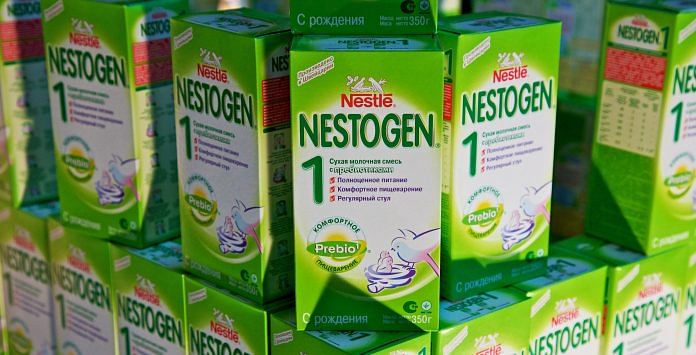New Delhi: It has been nearly three months since families in the US have been hit by a nationwide shortage of baby formula. President Joe Biden Wednesday said it will take “a couple more months” until supply is fully “back to normal”, following a meeting with some of the country’s top manufacturers.
Last week, the first shipment of infant formula from Europe arrived in Indiana on a US military plane. More shipments from the UK and Australia are scheduled to arrive in the coming weeks. This was under the Biden administration’s ‘Operation Fly Formula’ mission.
The crisis first began in February when a plant owned by a top manufacturer shut down, affecting the larger supply chain. But out-of-stock rates climbed significantly during the month of May. In the first week of May, 40 per cent of large retailers in the US were out of stock. This figure increased to 74 per cent for the week ending 28 May, according to reports.
The shortage has also led to price gouging in several states, leading Biden to call on the Federal Trade Commission for investigation into such incidents.
Baby formula — a powder or a liquid-concentrate consisting of dehydrated cow’s milk, vitamins and sugar, which when mixed with water can be used to feed infants — is considered to be a nutritious alternative to breast milk. Some infants also have specific baby formula requirements due to allergies or indigestion.
ThePrint explains how the Biden administration has treated the shortage of baby formula as a wartime event and how the crisis has led to concerns about monopolies in the baby formula market in the US.
Also read: What are wet bulb temperatures, and why they probably won’t cross 35°C long enough to be lethal
What is the Defense Production Act invoked by Biden
In February, baby formula manufacturing company Abbott was forced to halt production at one of its plants in Sturgis, Michigan due to contamination. This is the largest facility in the US for baby formula and a source of leading brands like Similac.
The company is currently cooperating with the US Food and Drug Administration under a legal agreement to reopen the site.
The Biden administration has treated the ongoing crisis as a wartime event. On 18 May, the US president invoked the Defense Production Act to speed up production and direct needed resources to baby formula manufacturers. He also launched the ‘Operation Fly Formula’ to speed up import of supplies using American war planes.
Passed in September 1950, the Defense Production Act has roots in the Korean War. At the time, there were fears that after the war, consumer goods and, to a degree, inflation, would hurt domestic defence production in the US, as a report in The Conversation points out. Defence production was necessary to counter China and the Soviet Union, which both backed North Korea in the Korean War.
The Act gave then US President Harry Truman powers to force manufacturers to make goods and supply services to support defence production and the authority to set wages and prices, as well as ration consumer goods.
Parts of the Defense Production Act have been amended over the years but its essence remains the same — “to ensure the vitality of the domestic industrial base“.
Are there monopolies in the baby formula market?
The shortage has also led to concerns about the fact that four companies control 90 per cent of the baby formula market in the US. These companies include Abbott which makes Similac, Reckitt Benckiser which makes Enfamil, Nestlé which makes Gerber, and Perrigo which makes store-brand formula.
There have also been concerns about how “sole-source contracting” under a federal programme known as the Special Supplemental Nutrition Program for Women, Infants, and Children (WIC), enables these companies to retain monopolies in certain states.
WIC primarily serves supplemental foods and access to health and social services for low-income pregnant, breastfeeding and postpartum women as well as to infants and children up to age five who are found to be at nutritional risks. As of 2018, 6.87 million people, spanning women, infants, and children, received WIC benefits each month.
This is how the programme works — to reduce costs, each state awards a “sole-source contract” to one baby formula manufacturer. This means that one manufacturer holds a contract for the entire state and all WIC recipients rely on that one manufacturer.
According to a report in Politico that used data from the National WIC Association, Abbott has 49 WIC contracts with states, territories and tribal organisations in the US. This covers about 47 per cent of children getting formula benefits through the WIC programme.
Also read: Padukone to Sindhu & Thomas Cup — the many times Indian badminton shone on world stage



